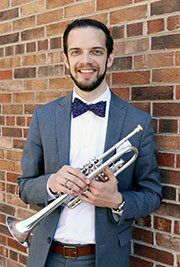
Like any instrument, trumpets are designed to suit the needs of varying types and levels of players, and there are many aspects to consider when choosing a trumpet. We’ll focus on recommendations for the student who has been playing at a relatively advanced level and is now looking for a good step-up instrument.
“Keeping all of these factors in mind, I can’t overstate the importance of trying out a variety of trumpets to determine which plays the best for a particular player.” – Dr. Ben Alle
When choosing a trumpet, it’s important to keep in mind that all manufacturer specifications and design differences combine to create the overall sound and feel of the instrument. Avoid the temptation to fixate on a certain design aspect such as bore size, bell flare, finish, or brand; focus instead on how the horn plays overall. The following are a few aspects to keep in mind when choosing a step-up trumpet.
Bore Size
Modern student trumpets are all built with a bore size, or tubing diameter of .459″ or .460″, which is the standard for all medium-large bore trumpets. For most players looking to upgrade from their student trumpet, medium-large bore is still the way to go, though larger and smaller bore sizes are also available. A medium-large bore trumpet will generally provide the most consistent feel and response for all-around trumpet playing, whereas the smaller and larger bore sizes are generally more common in more “specialized” trumpets geared toward specific types of playing.
Bell Flare
This is one of the more difficult design aspects to pin down. Some manufacturers label individual bell designs, but, with the exception of bell diameter measurements, they don’t go into the exact specifics of what makes one different than the other.
Sometimes differences in bell flare can be visually noticeable in terms of how rapidly the bell flares out toward the rim. The bead material around the rim of the bell, which is rolled into the lip of the bell, can also affect aspects such as ease of projection and core of the sound.
Valves
A trumpet’s valves may be made of various metals, though Monel and stainless steel are the preferred materials for intermediate to professional-level trumpets, while many student trumpet valves will be nickel-plated. Monel and stainless steel valves both tend to be more long-lasting, and because they’re solid metal, they don’t have the problem of the plating eventually wearing out. Pay attention to how the valves feel. Do they spring up right away after they are released? Do they move freely up and down? Watch out for any valves that seem to catch on something, or are sluggish, despite being freshly oiled.
Finish
A trumpet’s finish is more than just an aesthetic option. Most noticeably, silver plating can make a trumpet more responsive and projecting. A lacquered finish, on the other hand, can help a player achieve a warmer sound.
Try it out!
Keeping all of these factors in mind, I can’t overstate the importance of trying out a variety of trumpets to determine which plays the best for a particular player. Trumpets and mouthpieces are similar to shoes – it’s not a one-size-fits-all thing, but rather, a find-the-best-fit approach. The player should try a number of trumpets with a trusted teacher or other professional to make sure their intuition as a player matches up with what the audience hears at the other end of the bell. This way they’ll be able to confirm that the trumpet they end up with truly is the best fit.
Contact your Schmitt Music store, browse our online selection SHOP TRUMPETS, or get in touch with our Trumpet Specialist at The Trumpet Shop to set up your appointment today.
 Benjamin Alle, manager of the Schmitt Music Trumpet Shop, is a freelance trumpet
Benjamin Alle, manager of the Schmitt Music Trumpet Shop, is a freelance trumpet
performer and private lesson instructor in the Minneapolis-St. Paul area. He holds a Doctor of Musical Arts degree from the University of Minnesota School of Music, where he studied with Dr. David Baldwin. Dr. Alle is the principal trumpet of the Wayzata Symphony Orchestra and a member of the Minneapolis-based Compass Rose Brass Ensemble. He has also performed with the Thunder Bay Symphony, as well as a number of Minnesota-based ensembles, including the Kenwood and Mankato Symphony Orchestras, the Civic Orchestra of Minneapolis, and the Edina Chorale. He also serves as the chairman of the board of the Minnesota Latvian Concert Assocation and on the board of the Compass Rose Brass Ensemble.
Dr. Alle also received his Master of Music degree in trumpet performance from the University of Minnesota School of Music, during which time he studied with Dr. David Baldwin and Gary Bordner. He received his Bachelor of Music degree in trumpet performance from the Wheaton College Conservatory of Music, where he studied with Dr. Terry Schwartz.
